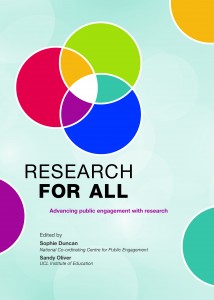We’ve just published an open access paper in a new journal called Research for all. (Scroll down for further details about the new journal.)
In the paper, we discuss how we supported future scholars of engaged research through a training programme that included some preparatory and follow-up activities, combined with a week-long residential element (Holliman and Warren, 2017).
In the paper we acknowledge that researchers in the UK are taking on new roles and responsibilities to meet the requirements of an expanded agenda for generating and evidencing social and economic impacts from research.
Within this wider context, culture change programmes have identified learning as an important driver of change. In the paper we outline a professional development programme developed to train postgraduate researchers studying environmental sciences in core skills in relation to engagement, influence and impact, and research, governance and organization.
We argue that training is an important step in further catalysing culture change in progressive ways. However, our research- and experience-informed critical reflections in supporting researchers suggest that there is still significant work to be done:
- to offer consistent messages to researchers at all grades about social impacts from research; and
- to ensure that public engagement is seen as an aspirational activity, embedded within research.
Key learning points
We offer the following learning points in the paper:
- Researchers, support staff and non-academic stakeholders require clarity and consistency in all messaging, assessments and feedback about the research impact agenda.
- Systematic culture change requires interventions in terms of purpose, process and people; significant among these is training and support for people (researchers, support staff and publics) at all stages in the research cycle, from conception to publication and beyond.
- Training and support should be combined with ongoing support mechanisms and measures to systematically recognise and reward excellence in engaged research.
Resources
We list the following resources as useful in the paper:
- Engaging Research, a Collection of Training Resources
- An Engaging Thesis, a Vision for Postgraduate Research in 2033
- Engaging with End-Users Playlist (see below)
References
Holliman, R. and Warren, C.J. (2017). ‘Supporting future scholars of engaged research’, Research for All: Universities and Society, 1(1), pp. 168-184. Available from: http://oro.open.ac.uk/48223.
Acknowledgements
The professional development workshops discussed in this paper were funded by NERC through an Innovation Award (NE/L002493/1). We are particularly grateful to Dr James Bendle and Sarah Kinahan for their support in developing and delivering these workshops.
Where relevant we have drawn on research findings and experiences from other similar workshops funded through an award made as part of the RCUK Public Engagement with Research Catalysts (EP/J020087/1) and a further award made through the RCUK School University Partnership Initiative (EP/K027786/1).
We acknowledge the many contributors to these projects whose shiny ideas we have cherry picked like over enthusiastic magpies, notably Dr Trevor Collins, Dr Gareth Davies, Sophie Duncan, Dr Dorothy Faulkner, Dr Helen Featherstone, Dr Ann Grand, Paul Manners, Dr Encarni Montoya and Fiona McKerlie.
In developing, enacting and assessing the relative successes of our professional development activities we worked closely with Dr Janet Sumner, Gerard Giogi-Coll and Thomas Ryan. We are also grateful to Jane Perrone and Gareth Davies for reading and commenting on drafts of this paper.

One of the previous workshops, conducted in 2014. The photo includes NERC-funded postgraduate researchers and three of the training team. Photo: Richard Holliman.
Finally, we acknowledge the contributions of the early-career and postgraduate researchers, the latter from the NERC-funded CENTA and Doctoral Training Programmes who participated in the workshops who helped to shape and improve the ideas that are now presented in this paper.
Research for All: Universities and Society
Research for All is a new open-access journal focusing on research that involves universities and communities, services or industries working together.
The new journal highlights the potential in public engagement for robust academic study, development of involved communities and research that has impact.
Theoretical and empirical analysis features alongside authoritative commentary to explore engagement with different groups and their cultures.
The journal is co-sponsored by the UCL Institute of Education and the National Co-ordinating Centre for Public Engagement (NCCPE). The journal is published by UCL IOE Press and is available on the ingentaconnect platform.


